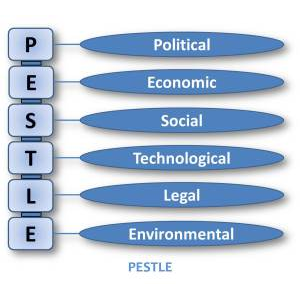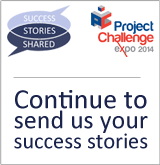
Cellnet’s decision to move staff to a new Head Quarters was not just about relocating 1500 people from various locations into a single site. The business sponsor wanted a real change in the behaviours and attitudes of individuals in the way they were working and in line with the underlying culture of the organisation. “Customers and suppliers should feel the energy and buzz when they come into the building”.
The new offices were to be open plan. Many of the staff in Cellnet had moved from British Telecom (BT) where personal offices were common and indeed expected. There was no doubt that there would be some resistance to the change. “We didn’t just want our staff to put up with the change. We wanted them to exploit the opportunities available for improved communications within and between working groups.” Eddie recognised the challenges the programme would bring. He needed to understand the project context – the environment in which it must succeed. Employing tools such as PESTLE and stakeholder (power and attitude) mapping, he created the first draft plans. These focused on the impacts that had to be achieved for the project to meet the Managing Director’s aims. Not on how it should it be done, but what changes were necessary and who needed to be influenced.
 Now he felt ready to meet with the people who would really understand the potential issues and challenges to be faced. A wider project team of around 40 people were selected from across the business and the vendors to help with the development of practical solutions to achieve the programme objectives. Initially Eddie engaged on a one-to-one basis with all team members, listening and gathering information. Then he brought selected team members together to brainstorm ideas. This workshop, rather like a risk workshop, focused on what could go wrong. What can we do to reduce resistance? What won’t people like? What can we do to anticipate and reduce resistance?
Now he felt ready to meet with the people who would really understand the potential issues and challenges to be faced. A wider project team of around 40 people were selected from across the business and the vendors to help with the development of practical solutions to achieve the programme objectives. Initially Eddie engaged on a one-to-one basis with all team members, listening and gathering information. Then he brought selected team members together to brainstorm ideas. This workshop, rather like a risk workshop, focused on what could go wrong. What can we do to reduce resistance? What won’t people like? What can we do to anticipate and reduce resistance?
A lot of great ideas came through. Some were more practical than others. One action that was very successfully adopted from the workshop was the setting up of visits to the new HQ site as it was being constructed. Staff could see their new working environment take shape. They could start to get used to the new accommodations and contribute ideas about how to make it work for them. More detailed potential problems were identified such as the control of air conditioning. In your own office you can control your ‘climate’. This would be trickier in the open plan offices and could lead to increased staff conflict levels. A decision was taken early-on to allow some control of temperature through zoning of the air condition controls.
It’s this kind of detail which illustrates the importance of engaging with the stakeholders very early in the process. In this way the design and build could take into account these suggestions. Imagine trying to change the aircon after all the wiring had been done! Eddie has been in project and programme management for many years. This was an early programme for him and he felt the big learning lessons then were:
- Get the planning going as early as possible.
- Make sure everybody is working to the same plan – that means engaging and communicating with a wide range of stakeholders, the business, users, vendors and contractors. “Often the comment I got when I tried to engage was – we’re not ready to talk yet. But you can never be too early to start to share information and identify potential interdependencies which need to be dealt with early.”
- A holistic approach to planning is essential. Eddie is a fan of the systems thinking model. Each part of the ‘system’ is interconnected and you need to understand how the interconnections work and how this affects the management and control of the programme.
- Engage the team – the stakeholders who will be impacted and who have a vested interest in the programme/project. They really “bring you back to earth” and make it clear what will, won’t and might not work.
What do you think?
My thanks to Eddie Fisher for sharing this story.
For further information on the Success Stories Shared initiative click here.
If you would like to share your success story you can email info@citi.co.uk
For further stories you can also visit http://www.pi3.co.za/success-stories-shared and http://www.virtualprojectconsulting.com/success-stories-shared/









